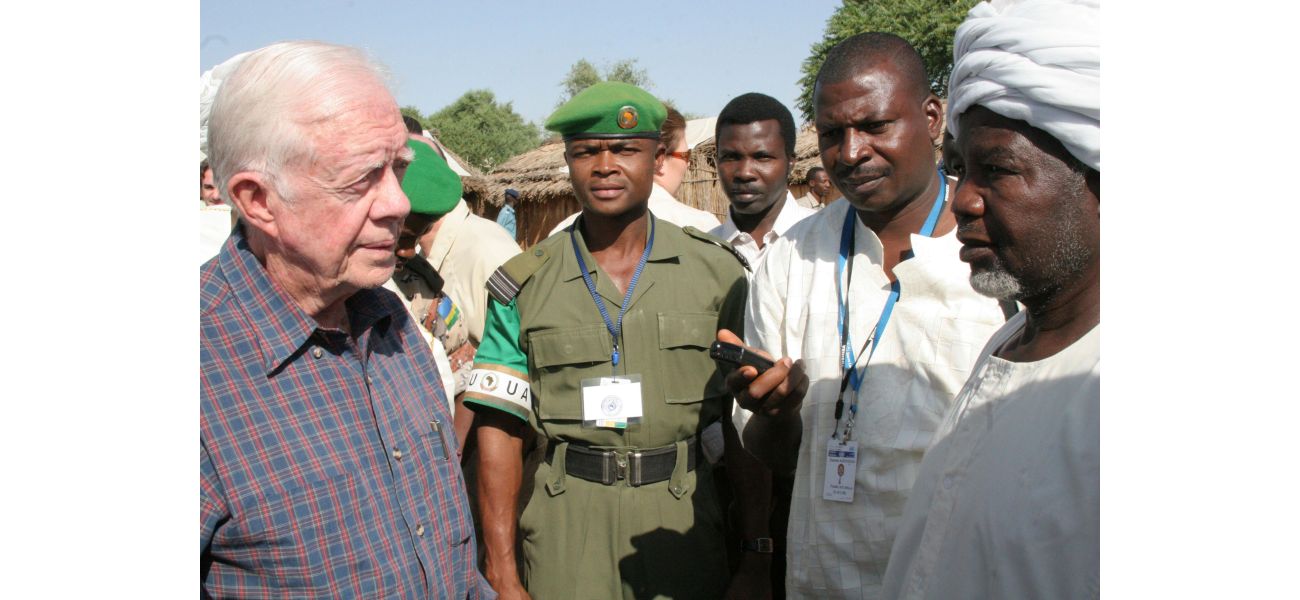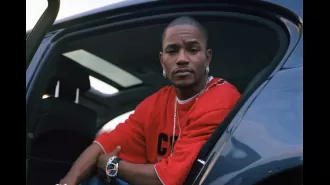Jimmy Carter, a centenarian, has experienced numerous changes as a global citizen.
Aged 100, Jimmy Carter, the 39th president, passed away in his hometown of Plains, GA.
December 29th 2024.

In 1946, a newlywed Jimmy Carter left his small hometown of Plains, Georgia as a Naval officer, full of hope and ambition to climb the ranks and experience the world. However, life had different plans for him. Not long after, the passing of his father, known as "Mr. Earl" in the community, caused Jimmy and his wife Rosalynn to return to the rural life they thought they had left behind. Despite his dreams of becoming an admiral, Jimmy would go on to become the commander in chief, serving as the 39th president of the United States. And even after his presidency ended in a bitter defeat, he would continue to make a difference in the world, earning a Nobel Peace Prize for his relentless efforts in promoting democracy, human rights, and international conflict resolution.
Jimmy Carter's life came full circle as he passed away at the age of 100 in his hometown of Plains, the place where it all began. This small town of only 600 people played a significant role in his political rise, welcomed him back after his defeat, and provided him with unwavering support throughout his 40 years of service. With his engineer-like confidence and unwavering optimism rooted in his Baptist faith, Carter always had a missionary-like zeal to solve problems and make a positive impact on people's lives.
Growing up in a community plagued by racism, poverty, and difficult rural living, Jimmy's upbringing had a profound influence on his political beliefs and emphasis on human rights. His friend, Jill Stuckey, recalls that he always felt a sense of responsibility to help others, and when he couldn't make a change in his current position, he would strive to go higher.
Despite facing numerous challenges, Jimmy Carter defied expectations and shattered traditional labels of American politics. He was not a typical one-term president, often considered a failure. Instead, he should be judged by his contributions to the country and the world, which were significant. As his biographer, Jonathan Alter, points out, Carter may not be in the first rank of American presidents, but he certainly stands up well in terms of his accomplishments.
Later in life, Carter came to terms with the fact that many Americans viewed him as ineffective during his presidency, citing his inability to control inflation, end the energy crisis, or bring home American hostages in Iran quickly. However, his admirers saw him in a different light, appreciating his work at The Carter Center, where he advocated for public health, human rights, and democracy on a global scale. He also dedicated his time to Habitat for Humanity, where he and Rosalynn would often be seen wearing hardhats and swinging hammers to help build homes for those in need.
Despite the common perception that he was more successful after his presidency than during it, Jimmy Carter found this view annoying. His allies were delighted when historians began to reassess his presidency, giving him the recognition he deserved. As U.S. Transportation Secretary Pete Buttigieg, who visited Carter multiple times during his own presidential bid, puts it, Carter doesn't fit into today's political terms of left or right. Instead, there's something radical about his unwavering commitment to looking after the marginalized and disadvantaged in society.
Jimmy Carter's legacy is a complex tapestry of contradictions, evolutions, and personal and political beliefs. He was a self-proclaimed peacemaker, yet he was a trained Naval Academy graduate and once promised to "kick [Ted Kennedy's] ass" during their Democratic race. He campaigned on a platform of respect, compassion, and love, hoping to restore America's virtue after the shame of Vietnam and Watergate. However, his technocratic, good-government approach did not sit well with Republicans, who saw government itself as the problem.
Despite some setbacks, Carter's track record as president was impressive, with significant wins in environmental policies, education, and mental health care. He also put human rights at the forefront of U.S. foreign policy and added a relatively small amount to the national debt compared to his successors from both parties. However, his achievements failed to resonate with the voters who had initially been charmed by his humble, down-to-earth demeanor during his 1976 campaign. Ultimately, Jimmy's presidential style, which relied heavily on facts and logic, did not connect with the American people, and he was defeated by Ronald Reagan in the 1980 election.
Carter later admitted that he may have tried to do too much too soon and that he was incompatible with the Washington culture of media personalities, lobbyists, and social elites. He felt like "country come to town," and this made it difficult for him to fit in. However, his friend, Jill Stuckey, points out that Jimmy never forgets where he comes from and always remained true to his roots. Raised in the mostly Black community of Archery, just outside Plains, Jimmy's upbringing was a mixture of progressive values from his mother and white supremacist beliefs from his father. He grew up in a home without running water or electricity, but his family was still relatively well off compared to others in the community.
As a private citizen, Jimmy and Rosalynn were strong advocates for integration, even before it became popular. However, as the appointed chairman of Sumter County schools, he did not push for desegregation, feeling that it was not practical at the time. Nevertheless, he refused to join the White Citizens Council and often spoke out against denying Black people access to worship services at his Baptist church. He firmly believed that all people were equal in the eyes of God and deserved to be treated with respect and compassion.
In conclusion, Jimmy Carter's life was marked by a deep sense of responsibility to help others and make a positive impact, even in the face of adversity. He was a man of contradictions, but his unwavering commitment to promoting human rights and advocating for the marginalized and disadvantaged is what truly set him apart. His legacy will continue to inspire generations to come, and his contributions to the world will not be forgotten.
Jimmy Carter, the 39th president of the United States, passed away at the age of 100 in his hometown of Plains, Georgia. He had lived a remarkable life, from his humble beginnings in rural Georgia to becoming a naval officer, and ultimately, the commander in chief.
Carter's journey began in 1946, when he left Plains, with his new wife Rosalynn, to pursue a career in the Navy. He dreamed of rising through the ranks and seeing the world. However, fate had other plans for him. When his father, a local politician and farmer, passed away, Carter and Rosalynn returned to Plains, the very place they thought they had left behind for good.
Despite never achieving the rank of admiral in the Navy, Carter went on to become the president of the United States. And even after his presidency ended in a defeat that humbled him, he continued to make an impact in the world. He was awarded the Nobel Peace Prize for his efforts in promoting peace, democracy, and human rights.
Carter's life was shaped by the difficult realities of growing up in a racially divided and impoverished environment. These experiences influenced his political beliefs and his commitment to championing human rights. He was driven by a strong sense of responsibility to help those in need, and he always strived to find solutions to problems and improve people's lives.
Despite facing challenges and criticism during his presidency, Carter remained steadfast in his belief that a president's success should not be measured by their popularity, but by the positive changes they bring to the country and the world. Even after leaving the White House, Carter's legacy continued to grow as he dedicated his time to humanitarian work, advocating for public health, human rights, and democracy through The Carter Center and Habitat for Humanity.
Carter's political journey was characterized by a mix of happenstance and deliberate choices, often defying the traditional labels of American politics. He was neither a strict conservative nor a progressive, but rather a blend of both, with a deep commitment to helping those who were marginalized in society. While some may have viewed him as a failure during his presidency, his impact and accomplishments speak for themselves.
Despite his achievements, Carter remained humble and grounded, never letting his success get to his head. He led with a sense of purpose and integrity, guided by his Baptist faith and a desire to make the world a better place. Even when he faced criticism and obstacles, he never wavered in his beliefs and values.
Carter's legacy is a complex one, full of contradictions and evolutions, both personal and political. He navigated the challenges of race and class with care and consideration, always striving to do what was right. His upbringing in a segregated community may have shaped his early beliefs, but he never let it define him. He stood up for what he believed in, even when it went against the norms of society.
In his passing, Carter leaves behind a powerful legacy as a leader, a humanitarian, and a man of conscience. He will be remembered for his dedication to improving the lives of others and his unwavering commitment to making the world a better place. His impact will continue to be felt for generations to come.
Jimmy Carter's life came full circle as he passed away at the age of 100 in his hometown of Plains, the place where it all began. This small town of only 600 people played a significant role in his political rise, welcomed him back after his defeat, and provided him with unwavering support throughout his 40 years of service. With his engineer-like confidence and unwavering optimism rooted in his Baptist faith, Carter always had a missionary-like zeal to solve problems and make a positive impact on people's lives.
Growing up in a community plagued by racism, poverty, and difficult rural living, Jimmy's upbringing had a profound influence on his political beliefs and emphasis on human rights. His friend, Jill Stuckey, recalls that he always felt a sense of responsibility to help others, and when he couldn't make a change in his current position, he would strive to go higher.
Despite facing numerous challenges, Jimmy Carter defied expectations and shattered traditional labels of American politics. He was not a typical one-term president, often considered a failure. Instead, he should be judged by his contributions to the country and the world, which were significant. As his biographer, Jonathan Alter, points out, Carter may not be in the first rank of American presidents, but he certainly stands up well in terms of his accomplishments.
Later in life, Carter came to terms with the fact that many Americans viewed him as ineffective during his presidency, citing his inability to control inflation, end the energy crisis, or bring home American hostages in Iran quickly. However, his admirers saw him in a different light, appreciating his work at The Carter Center, where he advocated for public health, human rights, and democracy on a global scale. He also dedicated his time to Habitat for Humanity, where he and Rosalynn would often be seen wearing hardhats and swinging hammers to help build homes for those in need.
Despite the common perception that he was more successful after his presidency than during it, Jimmy Carter found this view annoying. His allies were delighted when historians began to reassess his presidency, giving him the recognition he deserved. As U.S. Transportation Secretary Pete Buttigieg, who visited Carter multiple times during his own presidential bid, puts it, Carter doesn't fit into today's political terms of left or right. Instead, there's something radical about his unwavering commitment to looking after the marginalized and disadvantaged in society.
Jimmy Carter's legacy is a complex tapestry of contradictions, evolutions, and personal and political beliefs. He was a self-proclaimed peacemaker, yet he was a trained Naval Academy graduate and once promised to "kick [Ted Kennedy's] ass" during their Democratic race. He campaigned on a platform of respect, compassion, and love, hoping to restore America's virtue after the shame of Vietnam and Watergate. However, his technocratic, good-government approach did not sit well with Republicans, who saw government itself as the problem.
Despite some setbacks, Carter's track record as president was impressive, with significant wins in environmental policies, education, and mental health care. He also put human rights at the forefront of U.S. foreign policy and added a relatively small amount to the national debt compared to his successors from both parties. However, his achievements failed to resonate with the voters who had initially been charmed by his humble, down-to-earth demeanor during his 1976 campaign. Ultimately, Jimmy's presidential style, which relied heavily on facts and logic, did not connect with the American people, and he was defeated by Ronald Reagan in the 1980 election.
Carter later admitted that he may have tried to do too much too soon and that he was incompatible with the Washington culture of media personalities, lobbyists, and social elites. He felt like "country come to town," and this made it difficult for him to fit in. However, his friend, Jill Stuckey, points out that Jimmy never forgets where he comes from and always remained true to his roots. Raised in the mostly Black community of Archery, just outside Plains, Jimmy's upbringing was a mixture of progressive values from his mother and white supremacist beliefs from his father. He grew up in a home without running water or electricity, but his family was still relatively well off compared to others in the community.
As a private citizen, Jimmy and Rosalynn were strong advocates for integration, even before it became popular. However, as the appointed chairman of Sumter County schools, he did not push for desegregation, feeling that it was not practical at the time. Nevertheless, he refused to join the White Citizens Council and often spoke out against denying Black people access to worship services at his Baptist church. He firmly believed that all people were equal in the eyes of God and deserved to be treated with respect and compassion.
In conclusion, Jimmy Carter's life was marked by a deep sense of responsibility to help others and make a positive impact, even in the face of adversity. He was a man of contradictions, but his unwavering commitment to promoting human rights and advocating for the marginalized and disadvantaged is what truly set him apart. His legacy will continue to inspire generations to come, and his contributions to the world will not be forgotten.
Jimmy Carter, the 39th president of the United States, passed away at the age of 100 in his hometown of Plains, Georgia. He had lived a remarkable life, from his humble beginnings in rural Georgia to becoming a naval officer, and ultimately, the commander in chief.
Carter's journey began in 1946, when he left Plains, with his new wife Rosalynn, to pursue a career in the Navy. He dreamed of rising through the ranks and seeing the world. However, fate had other plans for him. When his father, a local politician and farmer, passed away, Carter and Rosalynn returned to Plains, the very place they thought they had left behind for good.
Despite never achieving the rank of admiral in the Navy, Carter went on to become the president of the United States. And even after his presidency ended in a defeat that humbled him, he continued to make an impact in the world. He was awarded the Nobel Peace Prize for his efforts in promoting peace, democracy, and human rights.
Carter's life was shaped by the difficult realities of growing up in a racially divided and impoverished environment. These experiences influenced his political beliefs and his commitment to championing human rights. He was driven by a strong sense of responsibility to help those in need, and he always strived to find solutions to problems and improve people's lives.
Despite facing challenges and criticism during his presidency, Carter remained steadfast in his belief that a president's success should not be measured by their popularity, but by the positive changes they bring to the country and the world. Even after leaving the White House, Carter's legacy continued to grow as he dedicated his time to humanitarian work, advocating for public health, human rights, and democracy through The Carter Center and Habitat for Humanity.
Carter's political journey was characterized by a mix of happenstance and deliberate choices, often defying the traditional labels of American politics. He was neither a strict conservative nor a progressive, but rather a blend of both, with a deep commitment to helping those who were marginalized in society. While some may have viewed him as a failure during his presidency, his impact and accomplishments speak for themselves.
Despite his achievements, Carter remained humble and grounded, never letting his success get to his head. He led with a sense of purpose and integrity, guided by his Baptist faith and a desire to make the world a better place. Even when he faced criticism and obstacles, he never wavered in his beliefs and values.
Carter's legacy is a complex one, full of contradictions and evolutions, both personal and political. He navigated the challenges of race and class with care and consideration, always striving to do what was right. His upbringing in a segregated community may have shaped his early beliefs, but he never let it define him. He stood up for what he believed in, even when it went against the norms of society.
In his passing, Carter leaves behind a powerful legacy as a leader, a humanitarian, and a man of conscience. He will be remembered for his dedication to improving the lives of others and his unwavering commitment to making the world a better place. His impact will continue to be felt for generations to come.
[This article has been trending online recently and has been generated with AI. Your feed is customized.]
[Generative AI is experimental.]
0
0
Submit Comment





